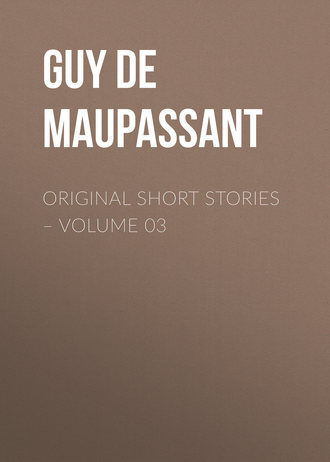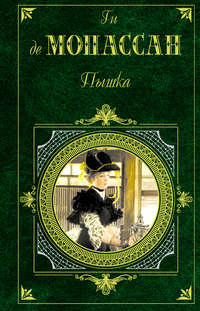 полная версия
полная версияOriginal Short Stories – Volume 03
As no one had much faith in his constancy, the test was prolonged through the winter, and Berthe’s hand was not granted him until the spring. The wedding took place in Paris at the beginning of May.
The young couple had decided not to take the conventional wedding trip, but after a little dance for the younger cousins, which would not be prolonged after eleven o’clock, in order that this day of lengthy ceremonies might not be too tiresome, the young pair were to spend the first night in the parental home and then, on the following morning, to leave for the beach so dear to their hearts, where they had first known and loved each other.
Night had come, and the dance was going on in the large parlor. ‘The two had retired into a little Japanese boudoir hung with bright silks and dimly lighted by the soft rays of a large colored lantern hanging from the ceiling like a gigantic egg. Through the open window the fresh air from outside passed over their faces like a caress, for the night was warm and calm, full of the odor of spring.
They were silent, holding each other’s hands and from time to time squeezing them with all their might. She sat there with a dreamy look, feeling a little lost at this great change in her life, but smiling, moved, ready to cry, often also almost ready to faint from joy, believing the whole world to be changed by what had just happened to her, uneasy, she knew not why, and feeling her whole body and soul filled with an indefinable and delicious lassitude.
He was looking at her persistently with a fixed smile. He wished to speak, but found nothing to say, and so sat there, expressing all his ardor by pressures of the hand. From time to time he would murmur: “Berthe!” And each time she would raise her eyes to him with a look of tenderness; they would look at each other for a second and then her look, pierced and fascinated by his, would fall.
They found no thoughts to exchange. They had been left alone, but occasionally some of the dancers would cast a rapid glance at them, as though they were the discreet and trusty witnesses of a mystery.
A door opened and a servant entered, holding on a tray a letter which a messenger had just brought. Jacques, trembling, took this paper, overwhelmed by a vague and sudden fear, the mysterious terror of swift misfortune.
He looked for a longtime at the envelope, the writing on which he did not know, not daring to open it, not wishing to read it, with a wild desire to put it in his pocket and say to himself: “I’ll leave that till to-morrow, when I’m far away!” But on one corner two big words, underlined, “Very urgent,” filled him with terror. Saying, “Please excuse me, my dear,” he tore open the envelope. He read the paper, grew frightfully pale, looked over it again, and, slowly, he seemed to spell it out word for word.
When he raised his head his whole expression showed how upset he was. He stammered: “My dear, it’s – it’s from my best friend, who has had a very great misfortune. He has need of me immediately – for a matter of life or death. Will you excuse me if I leave you for half an hour? I’ll be right back.”
Trembling and dazed, she stammered: “Go, my dear!” not having been his wife long enough to dare to question him, to demand to know. He disappeared. She remained alone, listening to the dancing in the neighboring parlor.
He had seized the first hat and coat he came to and rushed downstairs three steps at a time. As he was emerging into the street he stopped under the gas-jet of the vestibule and reread the letter. This is what it said:
SIR: A girl by the name of Ravet, an old sweetheart of yours, it seems, has just given birth to a child that she says is yours. The mother is about to die and is begging for you. I take the liberty to write and ask you if you can grant this last request to a woman who seems to be very unhappy and worthy of pity.
Yours truly, DR. BONNARD.
When he reached the sick-room the woman was already on the point of death. He did not recognize her at first. The doctor and two nurses were taking care of her. And everywhere on the floor were pails full of ice and rags covered with blood. Water flooded the carpet; two candles were burning on a bureau; behind the bed, in a little wicker crib, the child was crying, and each time it would moan the mother, in torture, would try to move, shivering under her ice bandages.
She was mortally wounded, killed by this birth. Her life was flowing from her, and, notwithstanding the ice and the care, the merciless hemorrhage continued, hastening her last hour.
She recognized Jacques and wished to raise her arms. They were so weak that she could not do so, but tears coursed down her pallid cheeks. He dropped to his knees beside the bed, seized one of her hands and kissed it frantically. Then, little by little, he drew close to the thin face, which started at the contact. One of the nurses was lighting them with a candle, and the doctor was watching them from the back of the room.
Then she said in a voice which sounded as though it came from a distance: “I am going to die, dear. Promise to stay to the end. Oh! don’t leave me now. Don’t leave me in my last moments!”
He kissed her face and her hair, and, weeping, he murmured: “Do not be uneasy; I will stay.”
It was several minutes before she could speak again, she was so weak. She continued: “The little one is yours. I swear it before God and on my soul. I swear it as I am dying! I have never loved another man but you – promise to take care of the child.”
He was trying to take this poor pain-racked body in his arms. Maddened by remorse and sorrow, he stammered: “I swear to you that I will bring him up and love him. He shall never leave me.”
Then she tried to kiss Jacques. Powerless to lift her head, she held out her white lips in an appeal for a kiss. He approached his lips to respond to this piteous entreaty.
As soon as she felt a little calmer, she murmured: “Bring him here and let me see if you love him.”
He went and got the child. He placed him gently on the bed between them, and the little one stopped crying. She murmured: “Don’t move any more!” And he was quiet. And he stayed there, holding in his burning hand this other hand shaking in the chill of death, just as, a while ago, he had been holding a hand trembling with love. From time to time he would cast a quick glance at the clock, which marked midnight, then one o’clock, then two.
The physician had returned. The two nurses, after noiselessly moving about the room for a while, were now sleeping on chairs. The child was asleep, and the mother, with eyes shut, appeared also to be resting.
Suddenly, just as pale daylight was creeping in behind the curtains, she stretched out her arms with such a quick and violent motion that she almost threw her baby on the floor. A kind of rattle was heard in her throat, then she lay on her back motionless, dead.
The nurses sprang forward and declared: “All is over!”
He looked once more at this woman whom he had so loved, then at the clock, which pointed to four, and he ran away, forgetting his overcoat, in the evening dress, with the child in his arms.
After he had left her alone the young wife had waited, calmly enough at first, in the little Japanese boudoir. Then, as she did not see him return, she went back to the parlor with an indifferent and calm appearance, but terribly anxious. When her mother saw her alone she asked: “Where is your husband?” She answered: “In his room; he is coming right back.”
After an hour, when everybody had questioned her, she told about the letter, Jacques’ upset appearance and her fears of an accident.
Still they waited. The guests left; only the nearest relatives remained. At midnight the bride was put to bed, sobbing bitterly. Her mother and two aunts, sitting around the bed, listened to her crying, silent and in despair. The father had gone to the commissary of police to see if he could obtain some news.
At five o’clock a slight noise was heard in the hall. A door was softly opened and closed. Then suddenly a little cry like the mewing of a cat was heard throughout the silent house.
All the women started forward and Berthe sprang ahead of them all, pushing her way past her aunts, wrapped in a bathrobe.
Jacques stood in the middle of the room, pale and out of breath, holding an infant in his arms. The four women looked at him, astonished; but Berthe, who had suddenly become courageous, rushed forward with anguish in her heart, exclaiming: “What is it? What’s the matter?”
He looked about him wildly and answered shortly:
“I – I have a child and the mother has just died.”
And with his clumsy hands he held out the screaming infant.
Without saying a word, Berthe seized the child, kissed it and hugged it to her. Then she raised her tear-filled eyes to him, asking: “Did you say that the mother was dead?” He answered: “Yes – just now – in my arms. I had broken with her since summer. I knew nothing. The physician sent for me.”
Then Berthe murmured: “Well, we will bring up the little one.”
THE RELIC
“To the Abbe Louis d’Ennemare, at Soissons“My Dear Abbe.
“My marriage with your cousin is broken off in the most stupid way, all on account of an idiotic trick which I almost involuntarily played my intended. In my perplexity I turn to you, my old school chum, for you may be able to help me out of the difficulty. If you can, I shall be grateful to you until I die.
“You know Gilberte, or, rather, you think you know her, but do we ever understand women? All their opinions, their ideas, their creeds, are a surprise to us. They are all full of twists and turns, cf the unforeseen, of unintelligible arguments, of defective logic and of obstinate ideas, which seem final, but which they alter because a little bird came and perched on the window ledge.
“I need not tell you that your cousin is very religious, as she was brought up by the White (or was it the Black?) Ladies at Nancy. You know that better than I do, but what you perhaps do not know is, that she is just as excitable about other matters as she is about religion. Her head flies away, just as a leaf is whirled away by the wind; and she is a true woman, or, rather, girl, for she is moved or made angry in a moment, starting off at a gallop in affection, just as she does in hatred, and returning in the same manner; and she is pretty – as you know, and more charming than I can say – as you will never know.
“Well, we became engaged, and I adored her, as I adore her still, and she appeared to love me.
“One evening, I received a telegram summoning me to Cologne for a consultation, which might be followed by a serious and difficult operation, and as I had to start the next morning, I went to wish Gilberte good-by, and tell her why I could not dine with them on Wednesday, but would do so on Friday, the day of my return. Ah! Beware of Fridays, for I assure you they are unlucky!
“When I told her that I had to go to Germany, I saw that her eyes filled with tears, but when I said I should be back very soon, she clapped her hands, and said:
“‘I am very glad you are going, then! You must bring me back something; a mere trifle, just a souvenir, but a souvenir that you have chosen for me. You must guess what I should like best, do you hear? And then I shall see whether you have any imagination.’
“She thought for a few moments, and then added:
“‘I forbid you to spend more than twenty francs on it. I want it for the intention, and for a remembrance of your penetration, and not for its intrinsic value:
“And then, after another moment’s silence, she said, in a low voice, and with downcast eyes:
“‘If it costs you nothing in money, but is something very ingenious and pretty, I will – I will kiss you.’
“The next day I was in Cologne. It was a case of a terrible accident, which had plunged a whole family into despair, and a difficult amputation was necessary. They lodged me in the house; I might say, they almost locked me up, and I saw nobody but people in tears, who almost deafened me with their lamentations; I operated on a man who appeared to be in a moribund state, and who nearly died under my hands, and with whom I remained two nights; and then, when I saw that there was a chance of his recovery, I drove to the station. I had, however, made a mistake in the trains, and I had an hour to wait, and so I wandered about the streets, still thinking of my poor patient, when a man accosted me. I do not know German, and he was totally ignorant of French, but at last I made out that he was offering me some relics. I thought of Gilberte, for I knew her fanatical devotion, and here was my present ready to hand, so I followed the man into a shop where religious objects were for sale, and I bought a small piece of a bone of one of the Eleven Thousand Virgins.
“The pretended relic was inclosed in a charming old silver box, and that determined my choice, and, putting my purchase into my pocket, I went to the railway station, and so on to Paris.
“As soon as I got home, I wished to examine my purchase again, and on taking hold of it, I found that the box was open, and the relic missing! I searched in vain in my pocket, and turned it inside out; the small bit of bone, which was no bigger than half a pin, had disappeared.
“You know, my dear little Abbe, that my faith is not very fervent, but, as my friend, you are magnanimous enough to put up with my lukewarmness, and to leave me alone, and to wait for the future, so you say. But I absolutely disbelieve in the relics of secondhand dealers in piety, and you share my doubts in that respect. Therefore, the loss of that bit of sheep’s carcass did not grieve me, and I easily procured a similar fragment, which I carefully fastened inside my jewel-box, and then I went to see my intended.
“As soon as she saw me, she ran up to me, smiling and eager, and, said to me:
“‘What have you brought me?’
“I pretended to have forgotten, but she did not believe me, and I made her beg, and even beseech me. But when I saw that she was devoured by curiosity, I gave her the sacred silver box. She appeared overjoyed.
“‘A relic! Oh! A relic!’
“And she kissed the box passionately, so that I was ashamed of my deception. She was not quite satisfied, however, and her uneasiness soon turned to terrible fear, and looking straight into my eyes, she said:
“‘Are you sure-that it is genuine?’
“‘Absolutely certain.’
“‘How can you be so certain?’
“I was trapped; for to say that I had bought it of a man in the streets would be my destruction. What was I to say? A wild idea struck me, and I said, in a low, mysterious voice:
“‘I stole it for you.’
“She looked at me with astonishment and delight in her large eyes.
“‘Oh! You stole it? Where?’
“‘In the cathedral; in the very shrine of the Eleven Thousand Virgins.’
“Her heart beat with pleasure, and she murmured:
“‘Oh! Did you really do that-for me? Tell me-all about it!’
“That was the climax; I could not retract what I had said. I made up a fanciful story; with precise details: I had given the custodian of the building a hundred francs to be allowed to go about the building by myself; the shrine was being repaired, but I happened to be there at the breakfast hour of the workmen and clergy; by removing a small panel, I had been enabled to seize a small piece of bone (oh! so small), among a quantity of others (I said a quantity, as I thought of the amount that the remains of the skeletons of eleven thousand virgins must produce). Then I went to a goldsmith’s and bought a casket worthy of the relic; and I was not sorry to let her know that the silver box cost me five hundred francs.
“But she did not think of that; she listened to me, trembling, in an ecstasy, and whispering: ‘How I love you!’ she threw herself into my arms.
“Just note this: I had committed sacrilege for her sake. I had committed a theft; I had violated a church; I had violated a shrine; violated and stolen holy relics, and for that she adored me, thought me perfect, tender, divine. Such is woman, my dear Abbe, every woman.
“For two months I was the most admirable of lovers. In her room, she had made a kind of magnificent chapel in which to keep this bit of mutton chop, which, as she thought, had made me commit that divine love-crime, and she worked up her religious enthusiasm in front of it every morning and evening. I had asked her to keep the matter secret, for fear, as I said, that I might be arrested, condemned, and given over to Germany, and she kept her promise.
“Well, at the beginning of the summer, she was seized with an irresistible desire to see the scene of my exploit, and she teased her father so persistently (without telling him her secret reason), that he took her to Cologne, but without telling me of their trip, according to his daughter’s wish.
“I need not tell you that I had not seen the interior of the cathedral. I do not know where the tomb (if there be a tomb) of the Eleven Thousand Virgins is; and then, it appears, it is unapproachable, alas!
“A week afterward, I received ten lines, breaking off our engagement, and then an explanatory letter from her father, whom she had, somewhat late, taken into her confidence.
“At the sight of the shrine, she had suddenly seen through my trickery and my lie, and at the same time discovered my real innocence of any crime. Having asked the keeper of the relics whether any robbery had been committed, the man began to laugh, and pointed out to them how impossible such a crime was. But, from the moment that I had not plunged my profane hand into venerable relics, I was no longer worthy of my fair-haired, sensitive betrothed.
“I was forbidden the house; I begged and prayed in vain; nothing could move the fair devotee, and I became ill from grief. Well, last week, her cousin, Madame d’Arville, who is your cousin also, sent me word that she should like to see me, and when I called, she told me on what conditions I might obtain my pardon, and here they are. I must bring her a relic, a real, authentic relic of some virgin and martyr, certified to be such by our Holy Father, the Pope, and I am going mad from embarrassment and anxiety.
“I will go to Rome, if needful, but I cannot call on the Pope unexpectedly, to tell him my stupid misadventure; and, besides, I doubt whether they allow private individuals to have relics. Could not you give me an introduction to some cardinal, or even to some French prelate who possesses some remains of a female saint? Or, perhaps, you may have the precious object she wants in your collection?
“Help me out of my difficulty, my dear Abbe, and I promise you that I will be converted ten years sooner than I otherwise should be!
“Madame d’Arville, who takes the matter seriously, said to me the other day:
“‘Poor Gilberte will never marry.’
“My dear old schoolmate, will you allow your cousin to die the victim of a stupid piece of subterfuge on my part? Pray prevent her from being virgin eleven thousand and one.
“Pardon me, I am unworthy, but I embrace you, and love you with all my heart.
“Your old friend,
“HENRI FONTAL.”









